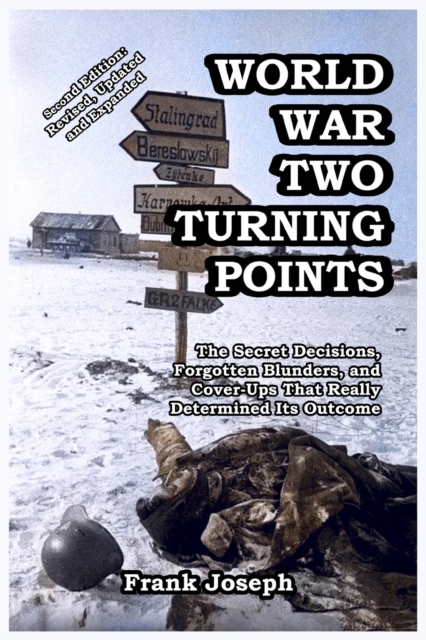
World War Two Turning Points : The Secret Decisions, Forgotten Blunders, and Cover-Ups That Really Determined Its Outcome Paperback / softback
by Frank Joseph
Paperback / softback
Description
Was the course of the Second World War decided at the battles of Stalingrad, El Alamein, Normandy, and Midway? Did Japan decide to surrender after the atom bomb attacks on Hiroshima and Nagasaki? Was Hitler an “incompetent military leader” whose bungling orders condemned the German armed forces to defeat?
This engrossing and encyclopedic work answers all these questions and many more, in a survey of the real causes of the ultimate outcome of that conflict—and reveals that the traditional interpretation of the war’s progress is not only false, but often deliberately misleading.
Highlighting twenty-one major events, decisions, and strategic failures, World War Two Turning Points reveals the much deeper, and often predetermined factors, which lie behind the well-known course of events.
Starting with the fact that the Allies cracked all the German and Japanese codes—and had advance notice of every single initiative—which played a major role in defeating the Axis juggernaut, World War Two Turning Points goes on to list all the other factors which made it impossible for the war to have gone in any other direction.
From this review, it becomes clear that Hitler was in fact a military genius whose decisions and orders, had they been carried through in full by his subordinates, were almost always correct. Only treason, code-breaking, and lower rank incompetence sabotaged the German leader.
Other topics covered include little known or understood strategic failures, such as the German navy’s decision to build capital ships instead of submarines, the Finnish army’s refusal to defeat the Soviets at Leningrad, Japan’s failure to invade the Soviet Union when that state was at its weakest point, and a full discussion of the German “wonder weapons” and how, but for lower-ranking mistakes, they could have changed the course of the entire conflict.
A gripping study, and highly recommended for anyone wishing to gain a deeper understanding of the driving forces behind the world’s greatest and most tragic conflict.
354 pages. Indexed. New second edition, completely revised and updated. Lavishly illustrated with 168 rare photographs.
Information
-
Item not Available
- Format:Paperback / softback
- Pages:354 pages, 168 Illustrations
- Publisher:Ostara Publications
- Publication Date:22/02/2020
- Category:
- ISBN:9781647135508
Information
-
Item not Available
- Format:Paperback / softback
- Pages:354 pages, 168 Illustrations
- Publisher:Ostara Publications
- Publication Date:22/02/2020
- Category:
- ISBN:9781647135508






